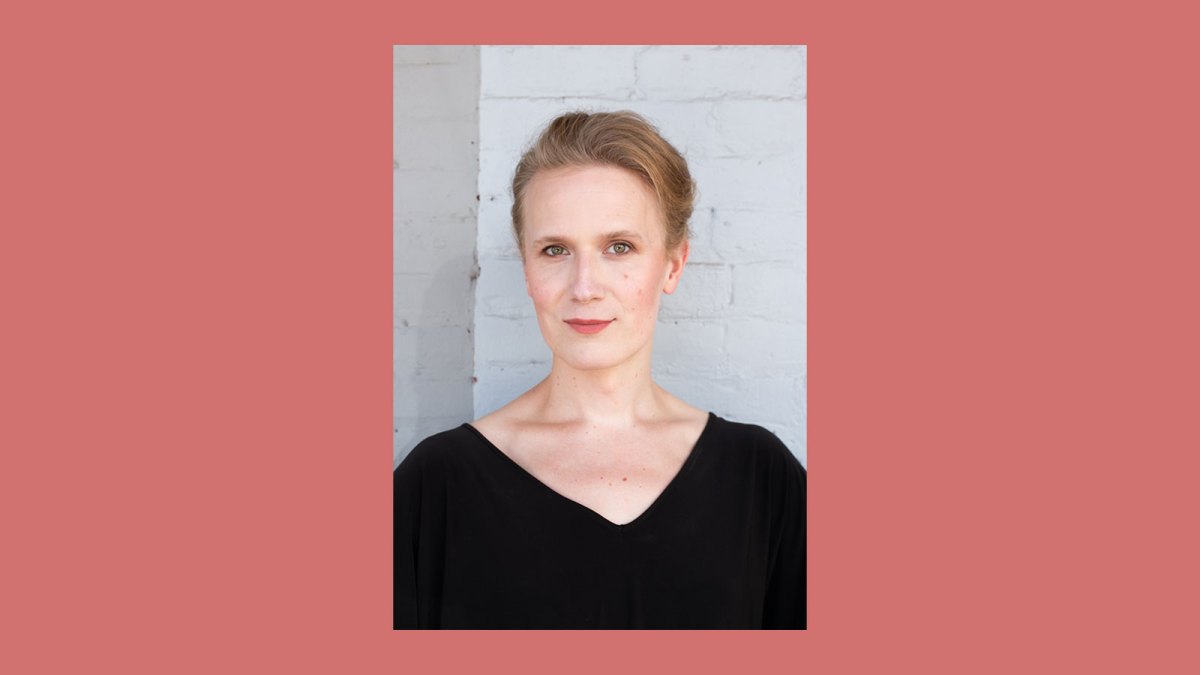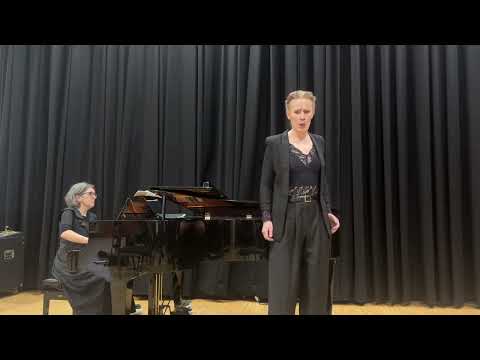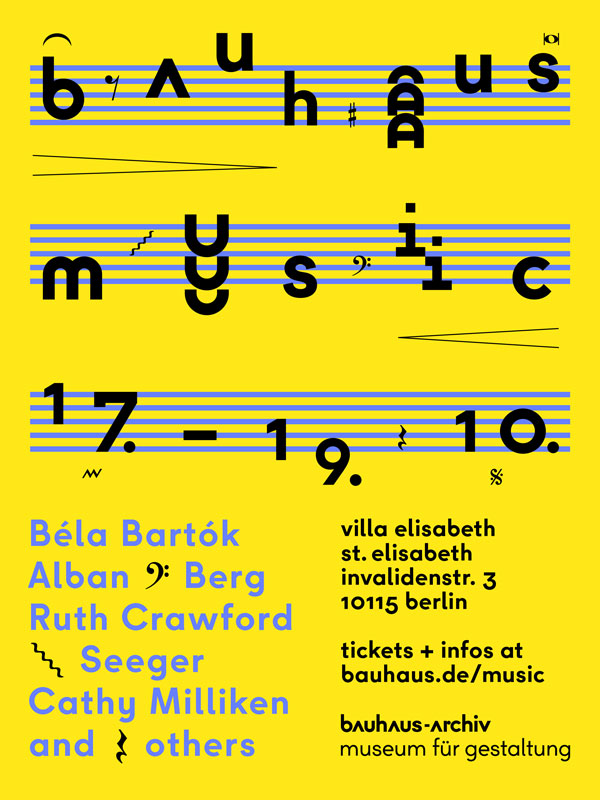Sam Taskinen recently celebrated the premiere of a new staging of Wagner’s “Das Rheingold,” playing the giant Fasolt, in Erfurt, Germany. Possessing a warm, sonorous bass-baritone, she has sung many of the important roles for her voice type: Fra Melitone in Verdi’s “La Forza del Destino,” Kaspar in Weber’s “Der Freischütz,” and Angelotti in Puccini’s “Tosca.” She was a member of the ensemble in Sankt Gallen, Switzerland, and as a freelancer has performed at stages like the Finnish National Opera in Helsinki and the Komische Oper Berlin.
In 2021, Taskinen came out as a trans woman. Since then, she has described her experience as a trans opera singer on social media. I spoke with Taskinen in advance of the International Day of Trans Visibility on March 31, via video chat, with her dog Princess jumping into the picture every now and then.
VAN: A while ago you posted an image on Instagram that read, “Wouldn’t it be nice to live in a world where living as your true self wasn’t seen as a form of activism?” Do you consider yourself an activist?
Sam Taskinen: In a way, yes. I would rather say, though, that I partake in activism. I have friends who are full-time activists and while I do feel like the type of work that I do is activism, I respect people who really devote their entire lives to activism too much to call myself an actual activist, if that makes sense. But I do think that it’s important for artists who stand for something to actually stand for it and talk about it. I don’t think that you need to be political to be an artist. But I do think that being an artist can open doors.
Because it gives you opportunities to speak your truth?
Yeah. And I think you do need a lot of integrity and honesty to be able to stand up on stage and do what we do.
When Lucia Lucas came out as trans, she received support, but also encountered prejudice. Has the classical music industry changed since then?
Of course I can’t speak for her, but I am sure that when Lucia came out it was less understood. The work that she has done has opened some eyes. Now people in the opera business have a point of reference. So in a way, when I took that step and made it public, things were a little smoother, because I wasn’t the first. At the same time, I think we are living in much scarier times than just a couple of years ago. The far right is rising quite rapidly, so I feel there’s a lot more harassment happening now. But I was very lucky to work at an opera house where my boss had some trans friends. The opera director in Sankt Gallen at the time was Peter Heilker, who is now at Theater an der Wien. He knew exactly what this was all about and he was very, very supportive.
Last season the opera house in Sankt Gallen featured the world premiere of “Lili Elbe” by Tobias Picker, an opera based on the true story of the first trans person to undergo gender reassignment surgery. You were also part of that production. Do we need more contemporary operas to reflect the experiences of trans and queer people?
Oh, yes, I do think so. I mean operas need to reflect their time. “Lili Elbe” is in fact the first opera that is very informed on what being trans is, but there is an 18th century opera about a trans woman actually. It is called “La Fille Garçon” by Joseph Bologne, who was of African descent. The plot was inspired by a diplomat named Chevalier d’Éon who openly lived as a woman. Back then you couldn’t change your first name and stuff, but this person was very much out in the open. Of course, you didn’t have the word for trans back then, but it shows that we were around and we were a part of the culture.
The latest from VAN, delivered straight to your inbox
Your core repertoire as a bass-baritone includes the roles of giants, kings, and fathers. Has the way you relate to these roles changed with your transition?
I feel the same about them, honestly. There is only one thing that has changed: Before I accepted myself, I was trying to be as masculine as possible in these roles. These days I feel more relaxed about it. I trust my acting abilities more.
Has your voice changed since you came out?
It has relaxed. I think my voice has grown in size because I used to store a lot of tension around my neck. When I came out all of this tension went away and my voice relaxed.
The way I understand it, trans women taking estrogen doesn’t affect the voice much—but trans men taking testosterone does, right?
That’s correct. If your larynx is fully formed, it is not going to shrink back.
How is the journey different for opera singers who are trans men?
I actually have some trans students who are on testosterone. The vocal technique is the same for everyone. It’s more about getting used to their voice and to how it feels in their body, because it feels and sounds different than before. It’s kind of like going through puberty. On testosterone you are going to use your chest voice more. This is a slow process which takes time.
Have things about the audition experience changed since you’ve transitioned?
Basically no, because I just go there as any other person auditioning would. Except that now I kind of go with the mezzo, trouser-role kind of look. The only thing that has happened a couple times is that I’ve gotten a bit of a cold shoulder from some of the mezzos who were also auditioning. And then after they heard me sing in my bass-baritone voice, they’re like: “What is happening?” But at first they’re looking at me thinking, “Oh god, that is a very tall, very low-voiced mezzo. We are not going to get this job.”
In opera, there are generally many more women competing for roles than men. But you’re a bass-baritone, which is still pretty rare. Would you say that being a woman is not a disadvantage for you?
Well, I do feel like I have to be that much better to get a job when I’m competing against men. And I am trying to be really careful when I say this: I feel like men in this business get a little more slack. It’s absolutely an expectation that when I arrive at a job, I have to be super well-prepared. Whereas, especially for some of the older men, there’s more room for maybe not being as well-prepared as they should be.
You recently posted about an incident where someone had reposted your singing on a Facebook page, and this post got a lot of insensitive comments. Does that kind of harassment happen often?
It does. And this one was particularly bad because it was someone who has quite a bit of following and knows a lot of people in the business. The problem wasn’t just a few nasty comments under a video. I would get private messages and terrible emails and terrible comments on my Instagram, my Facebook page, my YouTube channel—all directly addressed to me. So that made it extra difficult.
What steps need to be taken within the classical music industry to make queer and trans performers feel safe?
I think opera does have a huge problem with racism and misogyny and all of that. So I mean the people who work for the press departments of houses can be more active for sure. But first of all, we need a lot more women in leading positions in opera houses, as artistic directors. We need more queer people, and by that I don’t mean just white gay men, even though that is of course important representation too. But we need way more variety among the people in charge.
The problem isn’t so much that the people in charge don’t want to do good things. It’s just that some of them have a lot of blind spots. And we need to educate the press more, especially in Germany. There’s been a whole lot of really hateful stuff that I’ve read, not just in my case, but about women’s weight and so on. I’ve read some of the most disgusting stuff I’ve ever seen in my entire life in the German press.
Do you feel like your identity as a trans person sometimes gets sensationalized by the media?
Oh sure. Not in every case, but it has happened. And there have been cases where I felt that there were people who don’t want trans and queer people to be seen on stage and they hide behind giving critique. I’m perfectly fine with people criticizing me when it comes to my acting or my singing. That’s what my job is about. But if a review is about my appearance or who I am as a person, then that’s not really about how I’ve done my job.
As you’ve implied, the art form of opera itself can be very experimental, but the opera industry is also quite conservative—a lot of the repertoire and its aesthetics are rooted in a binary, gender-typical way of viewing the world. When you decided to come out as a woman, did you ever wonder if that might hurt your career?
In all honesty, I’m sure it has. The funny thing is, when people write nasty stuff their number one thing is saying, “Oh, now we’re just supposed to put these people on stage no matter how they sing?” And it’s the complete opposite: I have to sing extra well. And my experience has definitely been that I was taken more seriously before I transitioned, even though I was younger.
The paradox is that I have a rare voice type that opens doors, because there’s not so much competition. But at the same time, people don’t necessarily take me seriously in this voice type because of how I look. Before I transitioned, I would get way less direct opinions from men specifically about what I should be singing and how I should be dressing and what I should be doing. And now there’s a whole lot of opinions, and people think that because I’m a woman, I don’t know how to use my own brain or my own ears. And I think that is the experience all women have in this business. Even though you know exactly what you should be singing, you have to prove yourself over and over and over again, no matter which roles you have on your CV.
Is it fair to say since you’ve come out as trans, you have to always be on the very top of your vocal and musical game—even more so than before?
Yes, absoIutely. I feel my previous package was a much easier, more marketable one, because I’m tall and, back then, I was kind of big and I had a beard. I was somehow more convincing in people’s eyes. Now I’m a blonde woman, and people don’t take blond women very seriously anywhere in the world, which is such a sad thing. After I came out, there were people I had known for years who started to talk down to me as if I had all of a sudden lost half my IQ.
From where I am standing you have an impressive resumé. You’ve sung in major houses, you’ve just performed “Das Rheingold”…
I definitely have a good career. But I knew when I was starting to transition that it was going to be a different kind of a path, and I was going to be even more of an acquired taste. And that has proven to be true. If I am being completely open, I’ve had a hard time getting auditions after I transitioned, but usually when I got an audition, I also got the job—because usually people wanted me specifically. And that’s amazing. Before my transition I had an easier time getting auditions, but then I wouldn’t necessarily get booked.
Because there were a lot of singers like you out there.
Exactly. So it’s an interesting time, and will continue to be, because in the upcoming generation, there are already a lot more openly trans people entering the business. I hope that our generation has been able to open some doors for them.
Maybe that new generation will be less willing to sacrifice personal authenticity for professional success?
For sure, and it’s going to be very interesting because the opera world has a very stiff hierarchy, and I have a feeling that the next generation is going to blow that up.
Do you have any advice for younger singers who are in the process of transitioning or who are struggling with their gender identity?
Honestly, I think this advice applies to everyone who is entering the business: Make sure you are very clear about your personal boundaries. Make sure you have good people around you. And make sure that opera is not everything in your life. ¶
Subscribers keep VAN running!
VAN is proud to be an independent classical music magazine thanks to our subscribers. For just over 10 cents a day, you can enjoy unlimited access to over 875 articles in our archives—and get new ones delivered straight to your inbox each week.
Not ready to commit to a full year?
You can test-drive VAN for one month for the price of a coffee.





